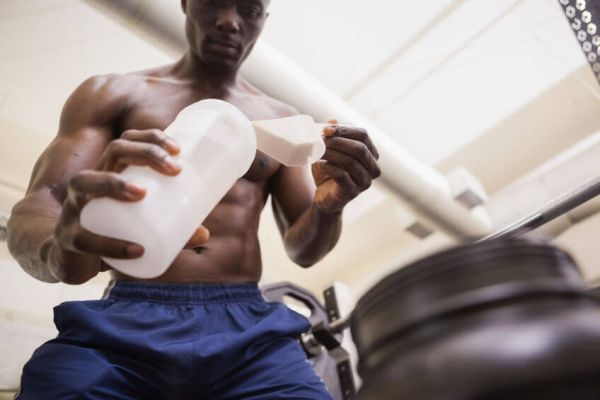I was at Vitamin Shoppe the other day and I figured I’d take at look at the fancy stuff they keep locked up in the back.
(If it’s behind lock and key, it must be good, right?)
As usual, the cabinet was packed full of loud, shiny bottles that claimed to contain revolutionary natural muscle builders.
The names always get me.
Cyclotren
Clenbuterex
D-Pol
T-Bomb
Beastdrol
Somnidren
There was a time when I would buy supplements like these and seriously hope they worked. In some cases I would have sworn they did work.
Well, I know better now. And here’s the truth:
The vast majority of supplements that claim to aid in muscle growth do absolutely nothing.
They’re little more than placebo pills and powders and anything you might think is happening is merely a confirmation of how the mind can affect the body.
That said, you can accelerate muscle growth with supplementation. There are a handful of supplements that are scientifically proven to work…if you buy and use them intelligently.
And that’s what we’re going to cover in this article:
Which supplements do and don’t help you build muscle faster and why, and how to get the most muscle-building bang for your supplement buck.
So let’s get to it, starting with the most popular type of “muscle builder” out there: the natural “testosterone booster.”
In the spirit of full disclosure, I want you to know that the supplements I recommend in this article are not just what I personally use but they are from my supplement line, LEGION.
As you probably know, the supplement industry is notorious for its lies and shenanigans. The truth is the majority of the supplements you see in the magazines and on the shelves aren’t going to help you reach your goals faster.
That’s why I decided to create the products I myself have always wanted: science-based formulations, clinically effective dosages of all ingredients, no fillers or unnecessary junk, and natural sweetening and flavoring.
You can learn more about LEGION and my goal to change the supplement industry for the better here.
And if you like what you see and decide to support my work…you’re awesome. 🙂
It’s because of people like you that I get to spend my time writing articles like this that help others get into the best shape of their lives.
Table of Contents
+Want to listen to more stuff like this? Check out my podcast!
Testosterone Boosters: Fact or Fraud?

With testosterone levels generally on the decline, natural testosterone boosters have quickly become of the biggest sellers for supplement companies.
And if we’re to believe even half of the hype used to sell these products, they’re basically natural steroids that will transform us into musclebound alpha males that make women swoon and men tremble.
Well, all the chest-thumping hyperbole found in the sales copy, the reality is…
The vast majority of natural testosterone boosters are completely worthless.
No, not “overrated” or “underwhelming”…but WORTHLESS. As in, will do more or less nothing to help raise testosterone levels and absolutely nothing to help you build muscle faster.
There are two major reasons for this:
- The formulations for these products usually rely on ineffective ingredients.
- Small fluctuations in testosterone levels won’t help you build more muscle.
The first point is self-explanatory: the ingredients in the products either have no evidence to support their use or have actually been proven to be ineffective in raising testosterone levels.
For example, three of the most popular ingredients in these supplements are Tribulus terrestris, ZMA, and D-aspartic acid.
Well…
- Multiple studies have proven that supplementation with Tribulus terrestris has no effect on testosterone levels, body composition, or exercise performance.
The research is crystal clear at this point: Tribulus terrestris simply doesn’t raise testosterone levels or help you build muscle or strength. End of story.
- ZMA is a combination of zinc, magnesium, and vitamin B6, and its story is about the same.
Many people’s diets are low in both zinc and magnesium, which is why I actually do recommend you supplement with these minerals for overall health (here’s what I take).
That said, unless you’re quite deficient in zinc, ZMA won’t increase your testosterone levels.
Thus, it’s a bit disingenuous to call zinc a “testosterone booster” because a) it won’t influence most people’s testosterone levels at all and b) when it does, it’s not raising the absolute ceiling of natural testosterone production–it’s simply eliminating a micronutrient deficiency that is suppressing testosterone production.
- D-aspartic acid is the most promising of the trio…but don’t expect much.
Research was published in 2009 that shows that D-aspartic acid could increase testosterone levels in both humans and rats, and supplement companies had a field day.
Bottles flew off the shelves as guys tried to get any and every muscle-building edge possible.
Well, two more studies on D-aspartic acid supplementation have been published since the 2009 one, and they help put this amino acid into perspective.
What you need to know is its testosterone boosting effects are unreliable and temporary. That is, some people may see an increase in testosterone and some won’t, and in many that do, the effects will be short lived.
The second point needs a little more explanation, but it boils down to this:
Relatively small fluctuations in testosterone levels–which is the best you could hope for through natural supplementation–have basically no effect on strength or muscle growth.
That is, if your testosterone levels are right-down-the-middle normal, and you increase them to a high-normal, you may feel a little better and notice a boost in libido…but it won’t enable you to build more muscle.
And that’s not just theory–there’s scientific evidence to back it up.
For example, a study conducted by researchers at McMaster University investigated if the acute hormonal changes that happen during weightlifting affect muscle and strength gains.
The subjects were young, resistance-trained men, and they did 5 weightlifting workouts per week and followed a standard “bodybuilding” diet.
After 12 weeks, scientists found that exercise-induced spikes in anabolic hormones like testosterone, growth hormone, and IGF-1 had no effect on overall muscle growth or strength gains.
That is, the size of the hormonal responses seen in the subjects varied widely but there was no significant difference in terms of muscle and strength gains.
Another study worth reviewing was conducted by researchers at Charles R. Drew University of Medicine and Science.
This involved manipulating the testosterone levels of 61 young, healthy men using a combination of testosterone and drugs to inhibit natural testosterone production.
After 20 weeks, scientists found there was a dose-dependent relationship between testosterone and leg strength and power (higher testosterone levels meant more strength and power)…
…but the effects weren’t significant until testosterone levels exceeded the top of the natural range by about 20 to 30% (about 1,200 ng/dL).
Now, this study does have an obvious limitation: the subjects weren’t exercising.
The strength and power gains would have been higher if subjects had been weightlifting, of course, but it’s telling nonetheless.
And just to lend further perspective on the matter, let’s review a bit of steroid research.
Scientists at Maastricht University published an extensive review of studies related to the use of anabolic steroids in 2004 and found the following:
- Muscle gains in people lifting weights on steroids ranged between 4.5 and 11 pounds over the short term (less than 10 weeks).
- The largest amount of muscle gain over the short term was 15.5 pounds over the course of 6 weeks.
(In case you’re wondering why the large variation in gains, a multitude of factors ultimately determined the results including training history, genetics, workout programming, diet, etc.)
Now, compare this to what you can achieve naturally and my point becomes clear:
Even when you blast your testosterone through the roof with drugs and add additional anabolic steroids on top, it doesn’t necessarily mean you’re going to gain “shocking” amounts of muscle.
So, all this is why natural testosterone boosters are just a waste of money and will never deliver the type of results you want.
Growth Hormone Boosters: More of the Same BS

Open any fitness magazine and you’re going to see at least a handful of advertisements for human growth hormone (HGH) boosters. And do you know what those supplements are going to do for you?
Absolutely nothing. One for one. Without question.
The HGH boosters you’ll find on the market today usually contain a mixture of amino acids and herbs with the occasional oddball “toss-ins.”
And the long story short is many of these ingredients have no effect on growth hormone production and those that do aren’t powerful enough to confer any real benefits.
Take, for example, the moelcule gamma aminobutyric acid (GABA).
Research shows that supplementing with this compound increases post-exercise growth hormone levels…but this transient increase will do nothing in the way of improving muscle growth.
Another bestseller is deer velvet antler, which is used in Traditional Chinese Medicine for various preventative health purposes.
Well, forget what Ray Lewis says. Research shows that deer velvet antler…
- Won’t improve your testosterone levels
- Won’t increase your levels of growth hormone
- Won’t help you build muscle or increase strength
Like with testosterone boosters, there’s a bigger picture to consider as well.
- Research supports the well-known fact among chemically enhanced bodybuilders that growth hormone alone doesn’t help you build more muscle–it must be combined with large amounts of anabolic steroids to have this effect.
If directly injecting the hormone every day doesn’t help you build more muscle and strength what could a natural supplement that can, at best, slightly increase daily production possibly do?
- Research shows that fluctuations of anabolic hormones within natural levels has little-to-no effect on muscle growth.
Someone with a middling anabolic hormone profile can do more or less as well in the gym as someone with a superb one. So there’s no need to waste money chasing minor increases in testosterone, growth hormone, or IGF-1.
Save your money and skip the HGH boosters.
Is HMB All It’s Cracked Up to Be?

HMB (beta-Hydroxy beta-methylbutyric acid–a mouthful indeed) is a metabolite of the amino acid leucine, and it has been making the rounds as a powerful new muscle builder.
The problem, though, is that the few studies used to sell these claims were conducted by Steven Nissen, the inventor of HMB and owner of the patent.
And when many millions of dollars are on the line, you’d better believe there’s an incentive for shenanigans.
Well, lo and behold, when you look at unbiased research on HMB, which has also been conducted with resistance-trained men and not the elderly, it’s much less effective than Nissen has reported.
For instance:
- A study conducted by Massey University found that HMB supplementation improved lower-body strength, but had negligible effects on body composition in resistance trained men.
- A study conducted by the Singapore Sports Council found that HMB supplementation had no effect on strength or body composition in resistance trained men.
- A study conducted by the University of Memphis found that HMB supplementation did not reduce catabolism or affect training-induced changes in body composition and strength in experienced resistance-trained males.
Researchers from Massey University also conducted a literature review on the subject of HMB supplementation, and their conclusion was very simple:
“Supplementation with HMB during resistance training incurs small but clear overall and leg strength gains in previously untrained men, but effects in trained lifters are trivial. The HMB effect on body composition is inconsequential.”
There is one benefit of HMB that’s well established, however: it’s an extremely effective anti-catabolic agent.
That is, it’s very good at preventing muscle breakdown, which means you will recover faster from your workouts and experience less muscle soreness (and the free acid form shows the most promise in this regard).
It also has no effect whatsoever on insulin levels, which makes it perfect for use with fasted training.
Its powerful anti-catabolic effects and non-existent insulin effects means you reap all the fat loss benefits of training fasted without any of the problems relating to muscle loss or insulin secretion.
It’s also worth noting that HMB is superior to leucine in suppressing muscle breakdown because it’s more anti-catabolic than its “parent” amino acid.
This means it’s also more effective than branched-chain amino acid supplements because they rely on leucine for their anti-catabolic effects (isoleucine and valine are very weak in this regard).
In terms of which specific HMB supplement I recommend, I’ve included a clinically effective dosage in every serving of my pre-workout fat burner FORGE.
FORGE is a fat burner made specifically for use with fasted training and it contains clinically effective dosages of…
- HMB. As you now know, HMB is very good at preventing muscle breakdown, and this means you will recover faster from your workouts and experience less muscle soreness.
- Yohimbine. Research shows that yohimbine enables your body to reduce fat stores faster, and it’s particularly useful as you get leaner and are battling with stubborn fat holdouts.
- Citicoline. CDP-choline (also known as citicoline) is a chemical that occurs naturally in the brain that increases levels of another chemical called phosphatidylcholine, which is vital for brain function.Research shows that supplementation with CDP-choline improves attentional focus, and I included this in FORGE because most people find fasted training more mentally draining than fed training and CDP-choline can help counteract this.
The bottom line is FORGE helps you lose fat–and “stubborn” fat in particular–faster, preserve muscle, and maintain training intensity and mental sharpness.
Does Protein Powder Help You Build Muscle Faster?

“If you want to build muscle faster, you should get some protein powder.”
That’s the first bit of supplement advice I ever got.
And it’s wrong.
Protein powder doesn’t directly help you build muscle faster.
Eating enough protein does, but you don’t need powders to get there. Whole foods alone can give you everything you need.
Protein powder doesn’t help you lose fat faster, either. A high-protein diet does, regardless of whether it includes protein supplements or not.
That said, attempting to get all the protein you need from food alone presents several challenges:
- It can make balancing your macronutrient intake tricky.
- It can be quite time consuming (shopping, prepping, cooking, cleaning up, etc.).
- Lugging around pre-made meals can be inconvenient.
- Eating large amounts of a small variety of high-protein foods can get old, fast.
Enter the protein powder, which is…
- Perfect for fast-and-easy snacking.
- Often preferable to having to eat another meal.
- Usually low in carbs and fat, which is great for meal planning purposes.
- Quite affordable in terms of price per gram of protein.
These are the main reasons why protein powders are the most popular types of supplements out there.
If you’re like me, and most people, you’ll find that dieting is just more enjoyable with protein powder, and that’s why I recommend and use them.
In terms of an actual product, mine is called WHEY+, and it’s essentially the whey protein powder I myself always wanted.
- WHEY+ is 100% whey isolate protein, not a blend of isolate and cheaper forms of protein.
- WHEY+ is 100% naturally sweetened and flavored.
- WHEY+ is made from milk sourced from antibiotic- and hormone-free cows on small dairy farms in Ireland, which are known for their exceptionally high-quality dairy.
- WHEY+ has no artificial junk like MSG or artificial food dyes.
- WHEY+ is made with cold micro- and ultra-filtration technologies.
Are There Any Supplements That Improve Muscle Growth?

So far I haven’t really delivered on the main promise of the article: the best supplements for muscle growth.
Well, now that we’ve debunked the majority of the junk on the market, let’s talk about what actually works.
And the place the start is the undisputed champion of natural muscle builders…
Creatine
Creatine is a substance found naturally in the body and in high amounts in foods like red meat.
It’s the most well-researched molecule in all of sports nutrition–the subject of hundreds of scientific studies–and its benefits are clear:
- It helps you build muscle faster.
- It helps you get stronger faster.
- It improves anaerobic endurance.
- It improves muscle recovery.
And the best part is it does all these things naturally and safely.
When it comes to improving body composition and workout performance, creatine is basically all pros and no cons.
There are many forms of creatine available, however, such as monohydrate, hydrochloride, citrate, ethyl ester, nitrate, and others.
Which is the best bang for your buck?
Well, the long story short is creatine monohydrate is the tried and true winner.
The other forms on the market are no more effective and, in some cases, even less effective than good ol’ monohydrate. (Which is great because monohydrate is also the cheapest!)
And that’s why I went with creatine monohydrate when creating a post-workout supplement for my line of supplements, LEGION.
It’s called RECHARGE and each serving contains:
- 5 grams of creatine monohydrate (the clinically effective dosage)
- 2100 milligrams of L-carnitine L-tartrate
- 10.8 milligrams of corosolic acid
This gives you the proven strength, size, and recovery benefits of creatine monohydrate plus the muscle repair and insulin sensitivity benefits of L-carnitine L-tartrate and corosolic acid.
It’s also 100% naturally sweetened and flavored and has no artificial fillers or other unnecessary junk.
Beta-Alanine
Beta-alanine is a nonessential amino acid, which means it isn’t a necessary part of the human diet because our bodies can create it.
(The amino acids the body can’t create are known as essential amino acids, and they must be obtained through the diet.)
Your body primarily uses beta-alanine to form a compound molecule called carnosine, which is stored in your muscles and brain. It does this by combining beta-alanine with an essential amino acid, L-histidine.
Now, one of carnosine’s roles in our muscles relates to the regulation of acidity levels.
When a muscle contracts repeatedly, it becomes more and more acidic. This, in turn, impairs its ability to continue contracting, until eventually it can no longer contract at all.
This is one of the ways muscles become fatigued.
Carnosine counteracts this by reducing muscle acidity, thereby increasing the amount of work the muscles can do before they become fatigued.
While there are many ways a muscle can fatigue during a workout, by targeting just one (acidity), performance can be enhanced.
Well, beta-alanine is a popular supplement because it gets converted into carnosine in the body, which then accumulates in the muscles.
This, in turn, increases the amount of work they can do before crapping out.
Beta-alanine’s major benefits lie in improving physical endurance and possibly body composition as well.
One rather impressive meta-analysis conducted in 2012 involved an in-depth review of 15 studies on beta-alanine as an ergogenic aid (performance enhancer).
Researchers found that beta-alanine supplementation resulted in a minor but statistically significant improvement in endurance (2.85%) when the exercise duration was between 60 and 240s (the duration you see in supersetting, Crossfit-style workouts, and the like).
And while beta-alanine tended to improve exercise lasting less than a minute or greater than three minutes in duration, the magnitude was very small and was not statistically significant.
That is, it’s not particularly helpful with relatively short or long bouts of exercise.
This is why many weightlifters take both beta-alanine and creatine, which notably improves performance in the sub-60-second realm and slightly improves performance in the 60-to-240-second realm.
In this way, they’re “covered” for everything they’re going to be doing in the weight room.
As for beta-alanine and muscle growth there are a few studies that note that even when performance between groups is controlled for (ie. same amount of work done for each group), it’s associated with more muscle growth.
That is, despite following the same types of diets and workout programs, people that supplement with beta-alanine seem to gain more muscle than those that don’t.
This effect doesn’t appear to be merely a byproduct of improved workout performance, either.
We don’t know exactly why just yet, but beta-alanine supplementation appears to directly (albeit slightly) augment muscle growth.
When you look at the data, 4.8 grams of beta-alanine per day is slightly more effective than 2 grams but there isn’t too much of a difference when the supplement is taken every day.
Like creatine, beta-alanine also seems to benefit from a “loading phase,” which allows it to accumulate carnosine in the muscles faster.
In this way, a higher dosage allows you to realize the benefits faster.
It’s also worth noting that it’s generally thought that people doing higher volume weightlifting programs may benefit from the upper end of the clinically effective range of beta-alanine.
This is because carnosine stores are depleted during muscle contractions so, naturally, the more you contract your muscles (workout), the more carnosine your body “uses.”
Although plausible, this theory hasn’t been demonstrated in scientific research yet.
So, given all the above, I think beta-alanine is a worthwhile supplement for boosting both muscle growth and exercise performance, and that’s why I included it in my pre-workout supplement PULSE.
PULSE contains more than just 4.8 grams of beta-alanine in each serving, though. It contains clinically effective dosages of 5 other natural ingredients proven to enhance your performance in the gym:
- Caffeine. Caffeine is good for more than the energy boost. It also increases muscle endurance and strength.
- Citrulline Malate. Citrulline is an amino acid that improves muscle endurance, relieves muscle soreness, and improves aerobic performance.
- Betaine. Betaine is a compound found in plants like beets that improves muscle endurance, increases strength, and increases human growth hormone and insulin-like growth factor 1 production in response to acute exercise.
- Ornithine. Ornithine is an amino acid found in high amounts in dairy and meat that reduces fatigue in prolonged exercise and promotes lipid oxidation (the burning of fat for energy as opposed to carbohydrate or glycogen).
- Theanine. Theanine is an amino acid found primarily in tea that reduces the effects of mental and physical stress, increases the production of nitric oxide, which improves blood flow, and improves alertness, focus, attention, memory, mental task performance, and mood.
And what you won’t find in PULSE is equally special:
- No artificial sweeteners or flavors..
- No artificial food dyes.
- No unnecessary fillers, carbohydrate powders, or junk ingredients.
The bottom line is if you want to know what a pre-workout is supposed to feel like…if you want to experience the type of energy rush and performance boost that only clinically effective dosages of scientifically validated ingredients can deliver…then you want to try PULSE.
The Bottom Line on the Best Supplements for Muscle Growth

When you see a supplement claim it can help you build muscle faster, you should be skeptical.
It probably can’t.
You see, supplements don’t build great physiques–dedication to proper training and nutrition does.
That said, while workout supplements don’t play a vital role in building muscle and losing fat, and many are a complete waste of money…the right ones can help.
The truth of the matter is there are safe, natural substances that have been scientifically proven to deliver benefits such as increased strength, muscle endurance and growth, fat loss, and more.
And you now know the two most reliable ones for building muscle faster–creatine and beta-alanine.
Use them and you will make faster progress in the gym.
What’s your take on muscle growth supplements? Have anything else to share? Let me know in the comments below!
Scientific References +
- More S. Global trends in milk quality: Implications for the Irish dairy industry. Ir Vet J. 2009;62(4):5-14. doi:10.1186/2046-0481-62-S4-S5
- McGlade E, Locatelli A, Hardy J, et al. Improved Attentional Performance Following Citicoline Administration in Healthy Adult Women. Food Nutr Sci. 2012;03(06):769-773. doi:10.4236/fns.2012.36103
- Thomson JS, Watson PE, Rowlands DS. Effects of nine weeks of beta-hydroxy-beta- methylbutyrate supplementation on strength and body composition in resistance trained men. J strength Cond Res. 2009;23(3):827-835. doi:10.1519/JSC.0b013e3181a00d47
- Nissen SL, Sharp RL. Effect of dietary supplements on lean mass and strength gains with re1. Nissen SL, Sharp RL. Effect of dietary supplements on lean mass and strength gains with resistance exercise: a meta-analysis. J Appl Physiol. 2003;94: 651–9. doi:10.1152/japplphysiol. J Appl Physiol. 2003;94(2):651-659. doi:10.1152/japplphysiol.00755.2002
- Panton LB, Rathmacher JA, Baier S, Nissen S. Nutritional supplementation of the leucine metabolite β-hydroxy-β- methylbutyrate (HMB) during resistance training. Nutrition. 2000;16(9):734-739. doi:10.1016/S0899-9007(00)00376-2
- Frisch H. Growth hormone and body composition in athletes. J Endocrinol Invest. 1999;22(5 Suppl):106-109. http://www.ncbi.nlm.nih.gov/pubmed/10442579. Accessed September 19, 2019.
- Sleivert G, Burke V, Palmer C, et al. The effects of deer antler velvet extract or powder supplementation on aerobic power, erythropoiesis, and muscular strength and endurance characteristics. Int J Sport Nutr Exerc Metab. 2003;13(3):251-265. http://www.ncbi.nlm.nih.gov/pubmed/14669926. Accessed September 19, 2019.
- Syrotuik DG, MacFadyen KL, Harber VJ, Bell GJ. Effect of elk velvet antler supplementation on the hormonal response to acute and chronic exercise in male and female rowers. Int J Sport Nutr Exerc Metab. 2005;15(4):366-385. http://www.ncbi.nlm.nih.gov/pubmed/16286669. Accessed September 19, 2019.
- Conaglen HM, Suttie JM, Conaglen J V. Effect of deer velvet on sexual function in men and their partners: a double-blind, placebo-controlled study. Arch Sex Behav. 2003;32(3):271-278. http://www.ncbi.nlm.nih.gov/pubmed/12807299. Accessed September 19, 2019.
- Powers ME, Yarrow JF, McCoy SC, Borst SE. Growth hormone isoform responses to GABA ingestion at rest and after exercise. Med Sci Sports Exerc. 2008;40(1):104-110. doi:10.1249/mss.0b013e318158b518
- Hartgens F, Kuipers H. Effects of androgenic-anabolic steroids in athletes. Sports Med. 2004;34(8):513-554. doi:10.2165/00007256-200434080-00003
- Storer TW, Magliano L, Woodhouse L, et al. Testosterone dose-dependently increases maximal voluntary strength and leg power, but does not affect fatigability or specific tension. J Clin Endocrinol Metab. 2003;88(4):1478-1485. doi:10.1210/jc.2002-021231
- West DWD, Phillips SM. Associations of exercise-induced hormone profiles and gains in strength and hypertrophy in a large cohort after weight training. Eur J Appl Physiol. 2012;112(7):2693-2702. doi:10.1007/s00421-011-2246-z
- D’Aniello G, Ronsini S, Notari T, et al. D-Aspartate, a Key Element for the Improvement of Sperm Quality. Adv Sex Med. 2012;02(04):45-53. doi:10.4236/asm.2012.24008
- Willoughby DS, Leutholtz B. D-Aspartic acid supplementation combined with 28 days of heavy resistance training has no effect on body composition, muscle strength, and serum hormones associated with the hypothalamo-pituitary-gonadal axis in resistance-trained men. Nutr Res. 2013;33(10):803-810. doi:10.1016/j.nutres.2013.07.010
- Topo E, Soricelli A, D’Aniello A, Ronsini S, D’Aniello G. The role and molecular mechanism of D-aspartic acid in the release and synthesis of LH and testosterone in humans and rats. Reprod Biol Endocrinol. 2009;7:120. doi:10.1186/1477-7827-7-120
- Koehler K, Parr MK, Geyer H, Mester J, Schänzer W. Serum testosterone and urinary excretion of steroid hormone metabolites after administration of a high-dose zinc supplement. Eur J Clin Nutr. 2009;63(1):65-70. doi:10.1038/sj.ejcn.1602899
- Rogerson S, Riches CJ, Jennings C, Weatherby RP, Meir RA, Marshall-Gradisnik SM. The effect of five weeks of Tribulus terrestris supplementation on muscle strength and body composition during preseason training in elite rugby league players. J strength Cond Res. 2007;21(2):348-353. doi:10.1519/R-18395.1
- Antonio J, Uelmen J, Rodriguez R, Earnest C. The effects of Tribulus terrestris on body composition and exercise performance in resistance-trained males. Int J Sport Nutr Exerc Metab. 2000;10(2):208-215. http://www.ncbi.nlm.nih.gov/pubmed/10861339. Accessed September 19, 2019.
- Saudan C, Baume N, Emery C, Strahm E, Saugy M. Short term impact of Tribulus terrestris intake on doping control analysis of endogenous steroids. Forensic Sci Int. 2008;178(1):e7-10. doi:10.1016/j.forsciint.2008.01.003
- Endocrine Press | Endocrine Society. https://www.endocrine.org/publications/endocrine-press. Accessed September 19, 2019.










